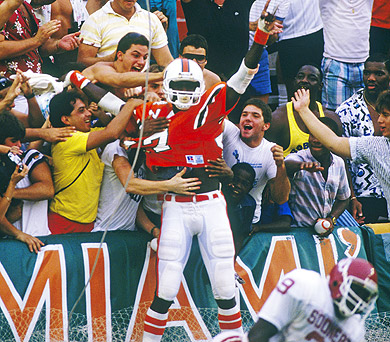'Cane Mutiny is a non fiction novel that was written by the famous sports writer Bruce Feldman. This novel chronicles the ups and downs of the University of Miami football team from the 1970's to 2000's. This program has won 5 national championships and produced a record numbers of NFL stars. The players are recognized just as much for their on field antics as what they do off of it. The Hurricanes, whose win records are only out done by their criminal records, were as the hall of fame wider receiver, Michael Irvin said, "Some bad boys." From nightclub altercations to fights on the field, the Canes were larger than life and always in the media spotlight. The novel's begins in the 1970's as the team is in shambles as the university is about to cut the football program. With the hire of a new coach, Howard Schellenburger and his guarentee to win, the Canes started to recruit and laid the ground work for years to come. In 1983, Schellenburger's last year, his guarentee came true. Miami was led by the young quarterback, Bernie Kosar (future Cleveland Brown), and the team defeated a highly touted Nebraska Cornhusker team 31 - 30. As the beloved Schellenburger left, in came a young man from Arkansas named Jimmy Johnson. Jimmy, who would go on to coach the world champion Dallas Cowboys, cemented what Miami is today. A famous Jimmy quote is "Only two things occur on that field. What I coach you to do or what I allow you to do." With that being said, Jimmy allowed quite a bit. A new brash Miami Hurricane team had arisen from the steets of Liberty City and Lakeland, Florida, coming together on the campus in Coral Gables. Led by greats like Vinny Testeverde, Michael Irvin, Jim Kelly, Alonzo Highsmith, the Hurricanes Swagger bubbled over into the community, stimulating the entire Miami region. With all the pleasantries of winning, so came the media spotlight and pressure to perform. Players often responded to this by rebelling against the world. Feeling under appreciated and under privelaged, the Canes were notorious for stealing, fighting, harrassing, and more while running the streets of Miami. Unable to afford the jerseys they made famous, players coupled with rap star Luther Campbell, formed a reward system. Money would go into assorted pots and whoever knocked certain players out of a game or scored touchdowns during a certain time frame would win the pot and all the money in it. Although highly illegal and grounds for dismissal by the NCAA, players received countless gifts from Campbell and other figures in Miami's social circles. Regardless of all the off the field issues, Thug U continued to win and dominate the college football landscape. Crushing teams like Texas, Penn St., Notre Dame, Michigan, Oklahoma, Miami demolished countless prestigous teams on their way to more national titles. To make matters worse, Miami was notorious for not just winning games but blowing teams out. At one point, they beat Notre Dame by 60 points! Rules and attitudes changed and restrictions came about, but the "Miami Vice" aura stuck and led to further recruiting commits by the likes of Ray Lewis, Ed Reed, Jeremy Shockey, Ken Dorsey, Warren Sapp, Randall Hill, Sean Taylor, Lamar Thomas, Clinton Portis, etc. Through the 80's and 90's Miami established itself as a college football dynasty winning more national championships over the last two decades than Notre Dame, Florida State and Oklahoma combined. "The U" tradition continues today with their last championship in 2001.
Discussion Questions:
1. Should college football players receive monetary compensation in addition to their scholarship for their contributions to their university?
2. Much is similar with athletes today, as the overwhelming responses they get fuel their egos and cocky attitudes. Are athletes born with these attitudes? Or is the news media and fans to blame for how they act?


2 comments:
No, football players should not receive "monetary compensation" for extra contributions to their university. The primary reason for someone to attend a college is to further their learning. Getting paid to play sports is a PROFESSION not a class that someone can study. Today, many football teams of universities are directly sponsored by alumni to pay for anything that might be needed, this includes jerseys. Due to the fact that football as a collegiate sport has been commercialized so much by the American public, I personally find it hard to believe that any monetary or material compensation is needed for already well funded teams.
From a personal perspective these players receive extremely little for all they do. As a team, yes they receive many privelages, but on a personal level (meal money, money for books, etc.) these players often receive very little. Most of these players cannot afford to go to these schools and all they have go to just paying for whats needed to get in. Often times their scholarships only pay for so much. With that being said, should you treat those football players the same as your everyday student? Are they doing more or less than the everyday student? Are they bringing in more or less money than the everyday student (i.e. ticket sales, bowl games, sponsoships, etc.)? Why should someone doing more for the school, helping draw revenue for the school, bringing attention to the school, be treated equal to someone whose an "everyday" student?
Post a Comment